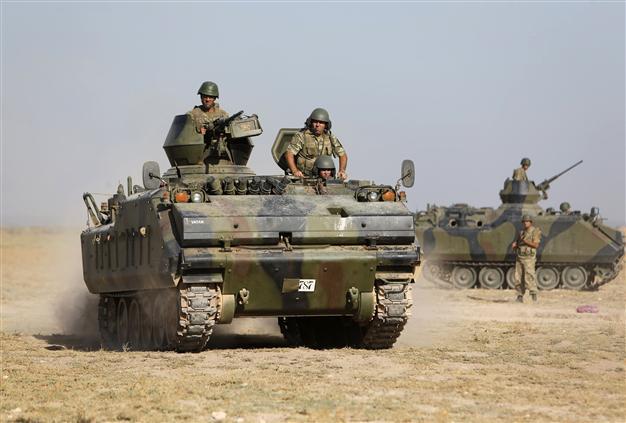Parliament gives green light to Syrian cross-border raids
ANKARA - Hürriyet Daily News

Turkish military armored personnel carriers take positions on the Turkish-Syrian border near the Akçakale border crossing,
which was hit by the Syrian mortars that killed five in the town. The situation is still tense among grieving families. REUTERS Photo
Turkey’s Parliament yesterday passed a government motion for a one-year mandate authorizing the military to use ground troops for cross-border military operations into Syria, after heated debates over the content of the motion and due to objections raised by the opposition to voting on such a significant motion in a closed-door session.
There were 449 deputies present in Parliament, and 320 voted in favor of the motion. Some 30 Justice and Development Party (AKP) deputies were not present due to scheduled visits outside of Ankara or abroad. Although Nationalist Movement Party (MHP) leader Devlet Bahçeli said earlier in the day “[The MHP] supports giving authority to the government,” and “The MHP acts by taking national interests into consideration,” it was speculated that a minority of MHP deputies voted in favor of the motion.
There were a total of 129 naysayers from the main opposition Republican People’s Party (CHP) and the Peace and Democracy Party (BDP). The complete content of the closed-door session, which lasted almost three and a half hours, will only be available to the public after ten years.
The quorum required to convene Parliament’s General Assembly is at least 184 lawmakers. If the item being voted on is not an exceptional constitutional provision, the majority of the votes of the lawmakers present is required to make a decision, but the quorum for a decision cannot be less than one-fourth of the members of Parliament, or 138 lawmakers.
The AKP has 326 seats in Parliament, while the CHP holds 135, the MHP 51, the BDP 29 and the Participatory Democracy Party (KADEP) holds 1. Seven lawmakers are independent. “Turkey has sent its message, in any event,” Foreign Minister Ahmet Davutoğlu told reporters after the vote, when asked whether “Syria got the message.”
‘Syria admitted responsiblity’Deputy Prime Minister Beşir Atalay told reporters that Syria had admitted responsibility for the shelling, apparently referring to remarks by Syrian Information Minister Omran al-Zoubi, who offered his “sincerest condolences on behalf of the Syrian government to the families of the deceased and the Turkish people.”
Atalay also said that Syria has reassured the U.N. that “such an incident will not occur again.” Stressing that the motion was “not a war mandate,” Atalay said that it would have a deterrent effect.
Earlier in the day the CHP held a special parliamentary group meeting presided over by its leader Kemal Kılıçdaroğlu. Speaking to reporters following the meeting, CHP Deputy Chair Faruk Loğoğlu called the motion before Parliament “a motion of war,” and said the CHP would object to it.
AKP deputy chair and spokesperson Hüseyin Çelik said the CHP’s labeling the motion a “motion of war” was a condemnable attitude. “Our citizens shouldn’t be troubled by this motion. The government and Parliament are in control of the situation.”
Addressing Parliament ahead of the closed-door session, the BDP’s parliamentary group deputy chair, Pervin Buldan, said her party would say “no” to the motion and criticized the closed session. “If you pick a war with Syria, you are going to send the poor children of Anatolia to fight that war, and no one will know about it. The public will not be aware of what is being discussed here,” Buldan said. Following the session, Kılıçdaroğlu said the government had not provided much information. “No information was given to us different from what the newspapers had already reported,” he said.
‘The intention is obvious’The motion read that it was “to send the Turkish Armed Forces [TSK] to foreign countries and giving it [the TSK] that mandate, according to principle causes that will be designated by the government,” raising questions about the definition of “foreign countries,” although the remainder of the motion clearly designated Syria as a target for possible cross-border operations.
AKP leaders, however, ruled out speculation over the content of the motion.
“We will not necessarily engage in a war when the motion passes. Many motions have been passed in the past, and did we engage in war? The opposition’s criticism is political. Everything is clear in the text of the motion. It is obvious that it appeared on the agenda due to Syria, and the agenda is clear,” the AKP’s Yalçın Akdoğan said, responding to the CHP’s Muharrem İnce, who said the motion had no limits.
“You could wage a world war under [the motion],” İnce said. The deputy chair of the AKP’s parliamentary group, Nurettin Canikli, also made it clear that the motion “could not be used against any other country than Syria.”
“This should not be interpreted as declaration of war, it is designed as a precaution,” Canikli said, adding that Turkey perceives the mortar fire that struck the border town of Akçakale on Oct.3 as having been “deliberate.”
“The negative impact of the ongoing crisis in Syria on our national security, as well as on regional stability and security, is increasingly being seen,” the motion read. “As part of the military operations being conducted by the Syrian Arab Republic Armed Forces, starting from Sept. 20, aggressive actions have been directed against our country’s territories as well. These actions have continued despite our repeated warnings and diplomatic initiatives. The aggressive actions directed against the territory of our country are on the threshold of an armed attack.”
“A naive, romantic motto like ‘no to war’ will not solve the problem. A great effort continues for mobilizing international community for providing the peace. The ones who try to test Turkey’s patience will get the necessary answers, like happened in the past. But nobody should try to manipulate the situation. We do not have any problem with Syrian nation,” said Egemen Bağış, European Union Minister.
